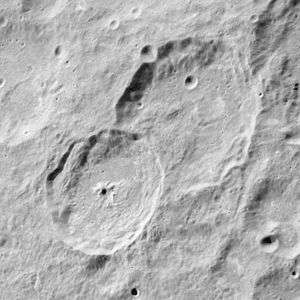Moiseev (crater)
 Oblique Apollo 16 mapping camera image, with Moiseev in lower left and Moiseev Z in upper right | |
| Coordinates | 9°30′N 103°18′E / 9.5°N 103.3°ECoordinates: 9°30′N 103°18′E / 9.5°N 103.3°E |
|---|---|
| Diameter | 59 km |
| Depth | Unknown |
| Colongitude | 254° at sunrise |
| Eponym | Nikolay Moiseyev |

Moiseev is a lunar impact crater that is located just on the far side of the Moon. It lies to the south-southwest of the slightly larger crater Hertz, and north of Saenger. To the southeast lies the irregular crater Al-Khwarizmi.
Moiseev overlies the southern rim of the larger satellite formation Moiseev Z. The crater is not significantly worn, and is marked only by a few tiny craterlets in the interior. The rim is generally circular, but has an outward bulge and a wider interior wall to the west-southwest. There are some terrace structures around the inner eastern wall, while the western inner wall has more of a slumped appearance. At the midpoint of the flattened interior is a formation of low hills forming the crater's central peak complex.
Naming
The crater is named after Nikolay Moiseyev. Prior to naming in 1970 by the IAU,[1] Moiseev was known as Crater 198, and Moiseev Z was known as Crater 197.[2]
Satellite craters
By convention these features are identified on lunar maps by placing the letter on the side of the crater midpoint that is closest to Moiseev.
| Moiseev | Latitude | Longitude | Diameter |
|---|---|---|---|
| S | 8.7° N | 100.7° E | 29 km |
| Z | 11.2° N | 103.4° E | 80 km |
Notes
- ↑ Moiseev, Gazetteer of Planetary Nomenclature, International Astronomical Union (IAU) Working Group for Planetary System Nomenclature (WGPSN)
- ↑ Lunar Farside Chart (LFC-1A)
References
- Andersson, L. E.; Whitaker, E. A. (1982). NASA Catalogue of Lunar Nomenclature. NASA RP-1097.
- Blue, Jennifer (July 25, 2007). "Gazetteer of Planetary Nomenclature". USGS. Retrieved 2007-08-05.
- Bussey, B.; Spudis, P. (2004). The Clementine Atlas of the Moon. New York: Cambridge University Press. ISBN 978-0-521-81528-4.
- Cocks, Elijah E.; Cocks, Josiah C. (1995). Who's Who on the Moon: A Biographical Dictionary of Lunar Nomenclature. Tudor Publishers. ISBN 978-0-936389-27-1.
- McDowell, Jonathan (July 15, 2007). "Lunar Nomenclature". Jonathan's Space Report. Retrieved 2007-10-24.
- Menzel, D. H.; Minnaert, M.; Levin, B.; Dollfus, A.; Bell, B. (1971). "Report on Lunar Nomenclature by the Working Group of Commission 17 of the IAU". Space Science Reviews. 12 (2): 136–186. Bibcode:1971SSRv...12..136M. doi:10.1007/BF00171763.
- Moore, Patrick (2001). On the Moon. Sterling Publishing Co. ISBN 978-0-304-35469-6.
- Price, Fred W. (1988). The Moon Observer's Handbook. Cambridge University Press. ISBN 978-0-521-33500-3.
- Rükl, Antonín (1990). Atlas of the Moon. Kalmbach Books. ISBN 978-0-913135-17-4.
- Webb, Rev. T. W. (1962). Celestial Objects for Common Telescopes (6th revised ed.). Dover. ISBN 978-0-486-20917-3.
- Whitaker, Ewen A. (1999). Mapping and Naming the Moon. Cambridge University Press. ISBN 978-0-521-62248-6.
- Wlasuk, Peter T. (2000). Observing the Moon. Springer. ISBN 978-1-85233-193-1.
External links
| Wikimedia Commons has media related to Moiseev (lunar crater). |